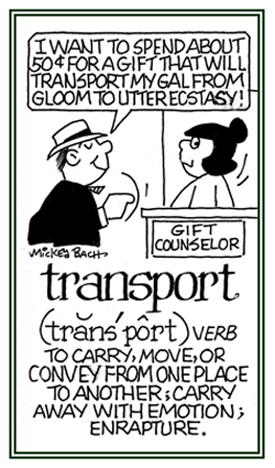2. The state or condition of rapture or strong, overwhelming emotions: Shareen felt the transport of the beautiful music from her radio as she was cleaning her apartment.
2. To put someone in a state of intense or uncontrollable emotion: Joe's girl friend was transported with great joy when he told her that he loved her and wanted to marry her.

Go to this Word A Day Revisited Index
so you can see more of Mickey Bach's cartoons.
2. The final common pathway of biological oxidation, the series of electron carriers in the inner mitochondrial membrane which pass electrons from reduced co-enzymes to molecular oxygen via sequential redox (oxidation-reduction) reactions coupled to proton transport, generating energy for biological processes.
It occurs in respiratory metabolism and in some types of fermentation.
It is also involved in the light reaction of photosynthesis.
2. The components of the final sequence of reactions in biological oxidations.They are composed of a series of oxidizing agents arranged in an order of increasing strength and terminating in oxygen.
2. The movement of ions across energy-transducing cell membranes.
Transport can be active, passive or facilitated. Ions may travel by themselves (uniport), or as a group of two or more ions in the same (symport) or opposite (antiport) directions.
3. Movement of salts and other electrolytes in the form of ions from place to place within living systems.Ion transport may occur by any of several different mechanisms; including, electrochemical diffusion, active-transport requiring energy, or bulk flow as in the flow of blood in the circulatory system of animals, or the transpiration stream in the xylem tissue of plants.
The best-known system for transporting ions actively is the sodium/potassium (Na/K) exchange pump, which occurs in plasma membranes of virtually all cells.
